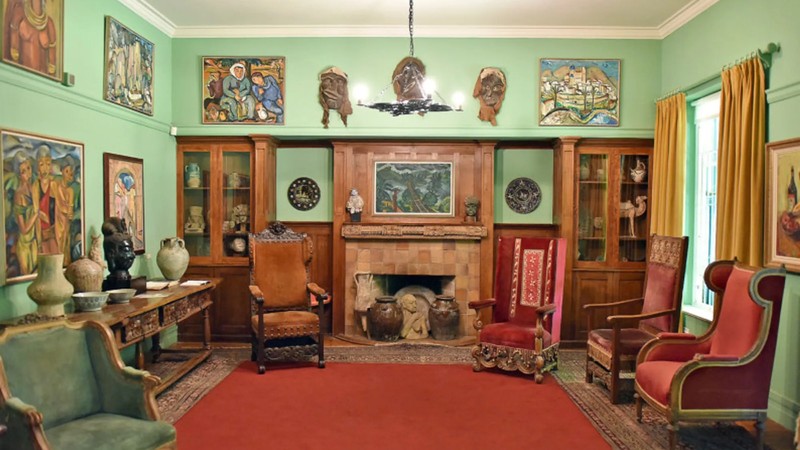Nedgroup Trust, which administers the Irma Stern Trust, has clarified its plans for the future of Irma Stern’s art collection following a wave of criticism over the sudden closure of the Irma Stern Museum at the University of Cape Town (UCT).
The decision brings to an end a 56-year partnership between the university and the Trust to manage The Firs, Stern’s former Rosebank home which has served as the museum since 1972. Under the 1969 Memorandum of Agreement, The Firs was owned by UCT, while the artworks and personal effects remained the property of the Trust.
UCT Council approved the termination of the agreement and the sale of The Firs back to the Trust in October, saying the move was made “with much sadness and regret.” The university said it had invested millions of rand over the years to preserve and operate the museum, covering salaries, maintenance, insurance, and security despite growing financial pressures.
“The Irma Stern Museum is very much part of the DNA of UCT and will forever be associated with the university,” said UCT Council Chair Norman Arendse (SC).
“However, both parties recognised the operational and financial constraints that made the current arrangement unsustainable.”
UCT’s Deputy Vice-Chancellor for Transformation, Student Affairs and Social Responsiveness, Professor Elelwani Ramugondo, added: “UCT is proud to have been a custodian of Irma Stern’s legacy for decades. As this new chapter begins, we look forward to seeing her work reach new audiences in innovative and impactful ways.”
According to Nedgroup Trust, a professional architectural assessment in 2023 found that The Firs no longer met international museum-grade standards and posed risks to the integrity of the collection.
The Trust plans to begin a major refurbishment in early 2026, ensuring the building’s preservation and continued link to Stern’s legacy.

“To safeguard the collection, the most vulnerable works will be relocated to a custom-designed conservation and restoration facility,” the Trust confirmed.
“While this space will not be open to the public for now, it will be accessible for academic and archival research.”
The Trust also said that all proceeds from the 2022 Strauss & Co auction were fully reinvested into museum operations, insurance, and storage, dismissing claims that funds were diverted elsewhere.
However, the closure has drawn sharp criticism from members of the art community, including Strauss & Co Chairperson Frank Kilbourn, who described the process as “haphazard” and said it lacked transparency.
“The haphazard way in which the decision was communicated did not assist in providing context or insight into the future plans for such an important institution,” Kilbourn said.
“Neither of the parties took the ISM Committee members into their confidence whilst negotiating the arrangement.”
Kilbourn said he was shocked and taken aback by the announcement, noting that the museum had become an integral and much-loved part of the local art landscape. He emphasised that the decision had caused widespread concern among Capetonians and art lovers across the world.
He explained that while the long-standing collaboration between UCT and the Trust had served the museum well for decades, it had come under strain due to rising operational costs and the university’s financial constraints.
“Like almost every university in our country, UCT faced budgetary constraints and had to prioritise its spending, focusing on its core activities, of which the running of the ISM was clearly not a key component,” he said.
Kilbourn said the situation called for “a renewed effort by Nedbank and the Trustees of the Irma Stern Trust to enter into a dialogue with affected role players and leaders in the art industry to examine alternative ways to deal with the challenges they face.”
He urged the Trust to involve art institutions, collectors and academics more closely in future governance.
“Ultimately, the Irma Stern Trust could benefit significantly from including such interested parties in the body of trustees and advisors to assist in shepherding this treasure in our midst to even greater heights and recognition.”
Kilbourn added that the overwhelming public support shown for the museum in recent days demonstrated how deeply people valued Stern’s legacy.
“Harnessing this interest and goodwill could provide an opportunity for renewed thinking about the future of such an iconic asset,” he said.
“At Strauss & Co, we look forward to being part of this debate and are willing to play a constructive role in facilitating a deeper understanding of the issues involved.”
In response to the backlash, the Trust will host a public consultation meeting at Nedbank’s Head Office at the Clocktower Precinct, V&A Waterfront, on 13 November at 3pm, to outline plans for the collection’s preservation and its reintroduction in future exhibitions.
“The Trustees remain steadfast in their commitment to honouring Stern’s enduring contribution to South Africa’s cultural landscape,” the Trust said.
“The Firs will remain an essential part of that legacy.”
Weekend Argus
